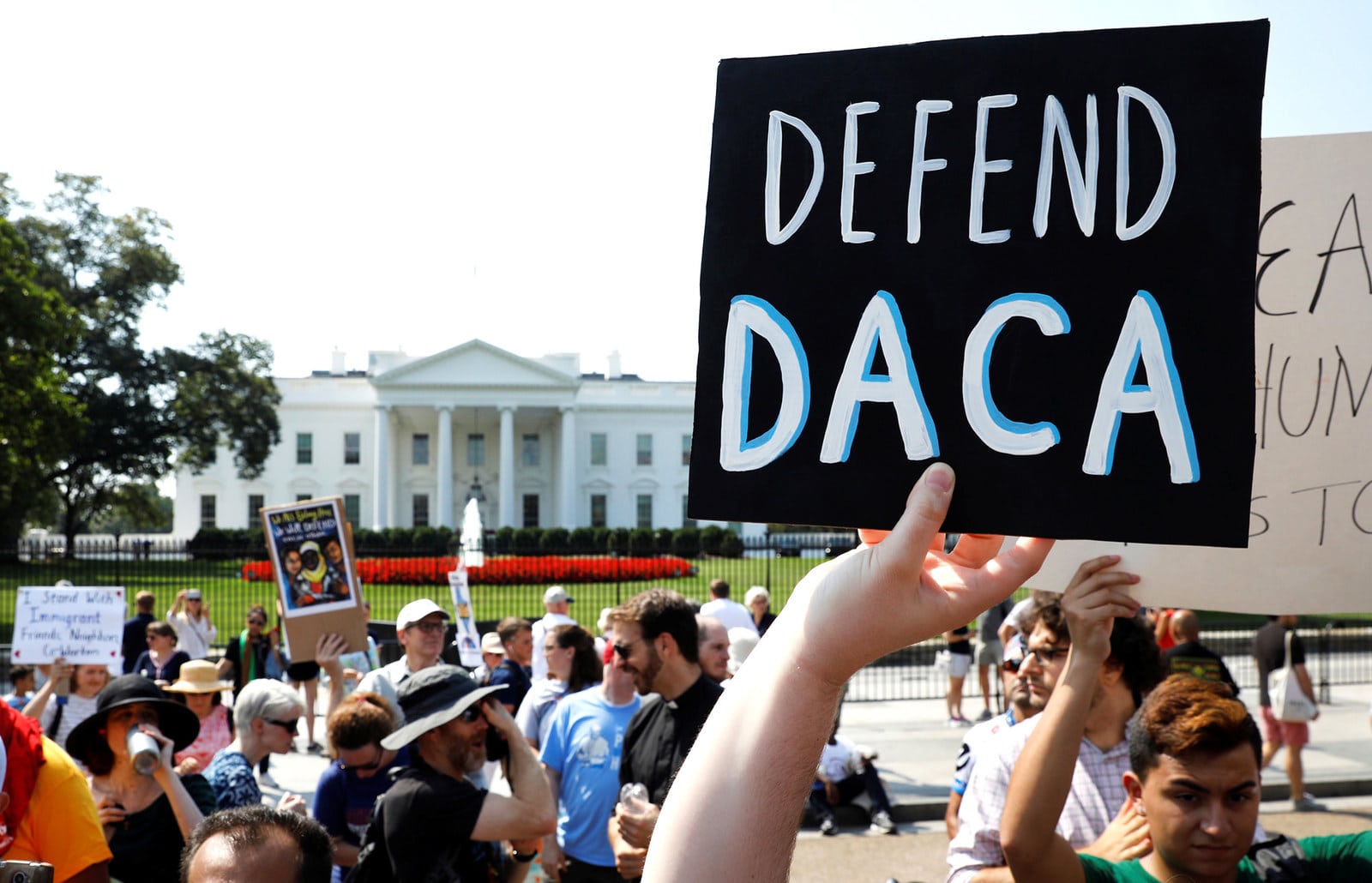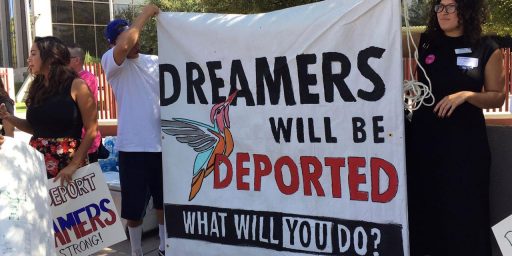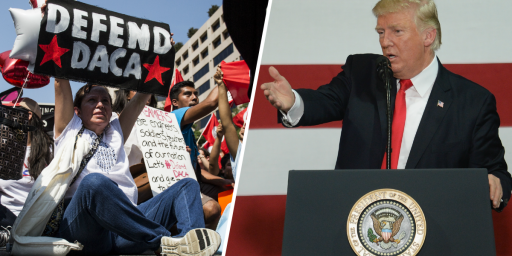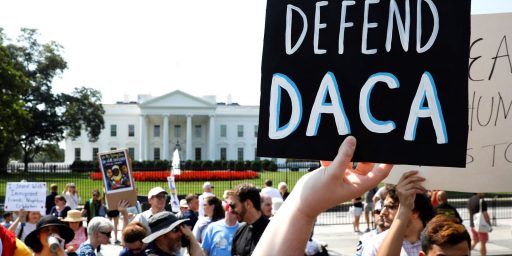Supreme Court To Hear Appeal In Challenges To Trump’s Moves Against DACA
The Supreme Court has agreed to hear an appeal in a series of cases challenging the President's decision to end the DACA program.

On it’s way out of town for the summer recess, the Supreme Court released it’s final Orders List, a list that is posted every week while the Court is in session that, among other things, lists the cases that the Justices have accepted for appeal, that it will hear the Trump Administration’s appeal of a ruling that struck down the President’s effort to end the Deferred Action for Childhood Arrivals (DACA) program:
The Supreme Court will decide whether the Trump administration may shut down a program that shields some 800,000 young, undocumented immigrants from deportation, the court said on Friday.
The court will hear arguments in the case during its next term, which starts in October, and will probably issue its decision in the spring or summer of 2020, ensuring a fierce immigration debate over the outcome in the midst of the presidential campaign.
Mr. Trump tried to end the program in 2017, when he called it an unconstitutional use of executive power by President Barack Obama and revived the threat of deportation for immigrants who had been brought to the United States illegally as young children.
But federal judges have ordered the administration to maintain major pieces of the program, Deferred Action for Childhood Arrivals, or DACA, while legal challenges move forward.
The fate of the DACA program and the young immigrants it protects, who are often called Dreamers, has been at the center of some of the most heated immigration debates in Washington since Mr. Trump became president.
Lawmakers in both parties had urged Mr. Trump not to end it, but he rejected that advice in September of 2017, calling the program an “end-run around Congress” and saying that Mr. Obama’s use of executive authority to protect the immigrants violated “the core tenets that sustain our Republic.”
At the same time, Mr. Trump — who has often expressed sympathy for the young immigrants — delayed the program’s termination by six months and urged Congress to pass legislation that would permanently protect them from deportation and give them an eventual path to citizenship.
With the deadline for the end of the program looming, several attempts to negotiate a deal between the White House and lawmakers failed amid demands from Mr. Trump for restrictive changes to immigration laws and billions of dollars to build a wall along the southwestern border.
The immediate pressure to make a deal faded when the courts temporarily forced Mr. Trump to continue operating the program. But that could change again if the court rules that the administration can end it.
(…)
The administration has argued that the program was an unconstitutional exercise of executive authority, relying on a ruling from the United States Court of Appeals for the Fifth Circuit, in New Orleans, concerning a related program. The Supreme Court deadlocked, 4 to 4, in an appeal of that ruling.
But the Ninth Circuit said the two programs differed in important ways, undermining the administration’s legal analysis. The appeals court affirmed a nationwide injunction ordering the administration to retain major elements of the program while the case moved forward. Such nationwide injunctions, which have been used by courts to block executive actions in both the Obama and the Trump administrations, have been the subject of much commentary and criticism.
Amy Howe at SCOTUSBlog comments:
This morning the Supreme Court added another blockbuster to its docket for next term, with the announcement that it will take up the challenge to the Trump administration’s decision to end the program known as “Deferred Action for Childhood Arrivals,” or “DACA.”
Established by the Obama administration in 2012, DACA allowed undocumented immigrants who had been brought to the United States as children to apply for protection from deportation and (among other things) permission to work in this country. In 2017, the Trump administration revealed its plans to terminate DACA, which would make some of the 800,000 young adults who qualified for the program eligible for deportation once again.
In January 2018, a federal judge in California issued an order that blocked the government from ending the program; similar orders from two other courts soon followed. The Trump administration came to the Supreme Court late last year, asking the justices to weigh in on two questions: Whether the decision to end DACA is the kind of action that courts can review at all; and, even if it is, whether the decision to end the program was legal.
The Trump administration also took the unusual step of asking the Supreme Court to hear its appeals even before the federal courts of appeals could rule on them. Because the justices will have to decide the dispute eventually, the government argued, they should go ahead and do it quickly: Until the issues are settled, the government will have to keep in place a policy that it believes is illegal and “sanctions the ongoing violation of federal law by more than half a million people.”
Just a few days after the government petitioned for review in the Supreme Court, the U.S. Court of Appeals for the 9th Circuit issued its decision in the government’s case. The court of appeals upheld the district court’s order requiring the Trump administration to keep the DACA program in place.
The justices considered the government’s appeals at two private conferences in January but then put them on hold. The cases returned for consideration at the justices’ conference on mid-June, and today the justices announced that they had granted review. The three cases will be argued together, likely in late fall.
The DACA saga began, of course, in September 2017 when the President issued an Executive Order providing that the DACA program would be terminated in six months time, meaning that it would have ended in March 2018. At the time, Republicans in both the House and the Senate, as well as the President himself, claimed that they wanted to find a way to codify the DACA program so that it would not end, there were even some suggestions that the GOP would be willing to expand eligibility for the program beyond the roughly 800,000 people who currently benefit from it cover as many as 2.5 million other adults who were brought to the United States as children but were not eligible for DACA relief under the criteria established by former President Obama.
When it came time to deliver on those promises, Republicans in both the House and Senate failed to even put forward a bill that would accomplish this. This led to two brief government shutdown crises at the start of 2018 as Democrats tried to use approval of a spending package to get protection for DACA beneficiaries. At one point, Senate Minority Leader Chuck Schumer had apparently reached a deal with the President that would have provided relief for DACA beneficiaries in exchange for $25 billion in funding for the President’s border wall, only to find out hours later that the President had changed his mind. This led Schumer to quip that negotiating with Trump was like negotiating with Jello. There were also unsuccessful efforts to bring a resolution to the DACA issue during the extended shutdown that ran from the end of December 2018 to the end of January 2019, but that also proved to be fruitless.
While these legislative moves were taking place, a number of legal challenges to the President’s action were taking place across the country. These developments resulted from lawsuits that had been filed by individual DACA recipients, by several state university systems, and by several states with a direct interest in the DACA program. The result has been that, while Congress and the President have dithered, the Federal Courts have been quite active in weighing in on the legality of the President’s action.
In January 2018, a District Court Judge in San Francisco ruled that the Administration’s efforts to repeal the program violated the law and issued an injunction barring the program from going into effect. That ruling was followed roughly a month later by a ruling from a second Federal Judge in Maryland who issued a similar ruling on much the same grounds as his colleague in San Francisco. In October 2018, a Federal Judge in New York City denied a motion seeking to dismiss a similar lawsuit against the Trump Administration order in a ruling that cited many of the same grounds as the previous two orders and which also cited in support of its conclusions rhetoric from the President both in his speeches and in his Tweets. Several months after this, in what many saw as a major setback for the Administration, the Supreme Court declined to disturb the injunction in the San Francisco case, meaning that the government was forced to go through the Ninth Circuit to appeal that case.
In April of last year a District Court Judge in Washington, D.C. issued yet another ruling placing a hold on the Administration’s attempt to bring an end to the DACA program. That ruling was significant in that it differed in one significant respect from the previous respects. Specifically, in addition to keeping the program in place, the ruling also directed the Trump Administration to begin accepting new applicants again.
Around the same time as the ruling in the case in the District of Columbia, the Ninth Circuit largely upheld the decision issued in January of last year by Judge William Alsop and kept in place a nationwide injunction barring enforcement of the Administration’s decision for the time being. Finally, and most recently, the Fourth Circuit Court of Appeals upheld the decision of a Maryland District Court Judge against the Administration’s attempt to end the DACA program, enjoining the Administration from enforcing the September 2017 order, and ordering the Administration to continue processing renewals for current DACA beneficiaries. All of these cases eventually made their way to the Supreme Court and will now be heard in the term that begins in October. In all likelihood that means that it is likely that the Court will rule on the Administration’s action at some point during the middle of the 2020 election cycle.
At this early stage, it’s difficult to say how the Court may be inclined to rule in this case. It’s worth noting, though, that in the majority of the cases noted above the primary basis upon which the District Courts and Circuit Courts of Appeal have ruled against the Administration was its failure to comply with various provisions of the Administrative Procedure Act (APA) which governs how Executive Branch agencies must act when taking regulatory action. Among other things, this law requires the agencies to provide a factual basis supporting the action and a notice and comment period during which members of the public can state their support or opposition to the action on the record. In each of the cases, the Courts below ruled that the Trump Administration did not follow those procedures and that the justification for ending the program was not sufficient. This is similar to the basis on which the Supreme Court, in its decision released yesterday, ruled against the Administration with respect to the use of the 2020 Census to inquire about citizenship.
With respect to the appeal itself, it’s also worth noting the two questions the Court will be reviewing, as summarized at the SCOTUSBlog Information Page for the consolidated cases:
(1) Whether the Department of Homeland Security’s decision to wind down the Deferred Action for Childhood Arrivals policy is judicially reviewable; and (2) whether DHS’s decision to wind down the DACA policy is lawful.
These are the two questions that the Court will consider on appeal. The first question basically goes to the question of whether or not the parties before the court in these consolidated cases have standing to bring the lawsuits in question and whether the Federal Courts can review the President’s action as a result. If that question is answered in the negative, then the rest of the case is basically moot and the DACA program will come to an end. If it’s answered in the affirmative then we get to the APA and other legal issues that form the basis for the challenge to President Trump’s action. At this early stage, of course, any prediction of how the Court will rule on either question is pure speculation. At the very least, we’ll have to wait until oral argument to get an idea of where the Justices may stand.




